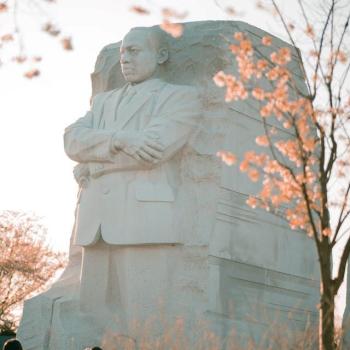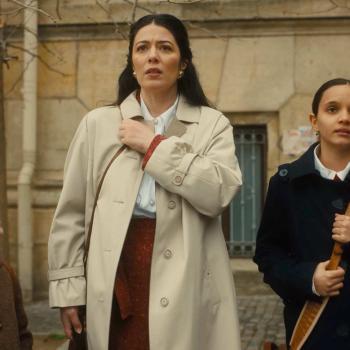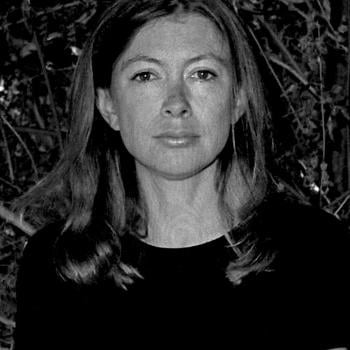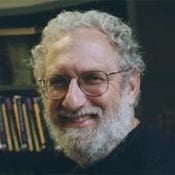"All I am suggesting is that you take those values and put them to work here, in all these encounters you have when you think about morality, about what life means, in this terrible time."
And then he was gone.
Over the next few years we met once in a while. He always came without warning—at a public lecture, during my office hours, even a few times after sitting, quietly, without taking off his coat, in the back row of one of my classes. We would go over this idea of his, this idea of moral conversation in a moral community, over and over again. It was attractive in so many ways, but so alien. I still wanted to win the argument, to be right. No matter how much I tried to think in a "spiritual, nonviolent" way (as I'd come to describe it) about moral conversation, I'd slip back into the old style. Samuel would point this out to me, over and over again, tapping me on the forearm for emphasis, sipping his coffee, sighing over what a blockhead I was. And I'd agree, and go back to where I started.
At times I would wonder how you could be open and still have a serious moral position. Wasn't Samuel just asking me to be wishy-washy—weak and unprincipled? What good was that to anyone—especially in a time of global environmental crisis, ethnic violence, vast inequalities of wealth, and a population so miserable that they took endless quantities of legal and illegal drugs just to get through the day? We desperately needed answers, a correct analysis, and unshakable moral values.
And then I remembered something from my youth, something I still think about with embarrassment. For a time in the late 1970s I was part of a tiny political group—fifteen of us actually—called "Jews for Justice." We were a collection of left-wing Jews who both supported Israel's right to exist and condemned its occupation of Palestinian land. We opposed anti-Semitism as well as colonialism, suicide bombing by terrorists as much as Israeli militarism. The established Jewish community hated us for supporting a two-state solution and criticizing Israel. And the Left hated us for supporting Israel's right to exist and for criticizing anti-Semitism. We were dedicated, passionate, concerned, highly educated, and very emotionally immature. Eventually differences within the group started to become our whole focus. One side placed too much emphasis on anti-Semitism. One side not enough. One side thought too much about the Occupation. One side only thought about terrorism. And on and on it went—more anger, more distrust, less and less listening, everyone sure they were right and the other side wrong. No wishy-washy types here, never fear. And then it got so bad we split up—into one group of eight and one of seven. We were going to solve the endless, intractable conflict between the Arabs and Israel—and we couldn't even get along with each other.
Wasn't that just what Samuel was talking about?
For a long time I didn't see him. He and his ideas faded from my mind, as I occupied myself with teaching and writing, political arguments and moral judgments. I worried about the environmental problems that kept getting worse and a kind of religious and political insanity that had erupted everywhere. I was frightened for the future of life on the planet, appalled by all the crazies, and mad at the people who wouldn't face the truth. I knew it wasn't much, but I had to prove them all wrong—at least to my students and the small readership of my books and articles. Being right was my defense against fear and a lurking sense of helplessness. If I wasn't right, what good was I?
One morning I got, for the first time, a phone call from Samuel. He asked after me, and while I was very glad to hear from him, I was concerned about how weak and throaty his voice sounded. "Are you all right?" I asked. He laughed, then coughed badly, then laughed again. "I am what I am, just like God."
He told me to meet him in the same coffee place we'd first talked, in the late afternoon of the next day.
When I got there he was nowhere to be seen. So I got some tea and waited. Time passed, my mind wandered to our many meetings, and Samuel's ideas of a spiritual, nonviolent moral conversation to sustain a moral community. As I was going over his ideas once more a tap on the shoulder brought me out of myself. "You Professor Gottlieb?" asked a slender, teenage girl in black sweater. "Yes," I told her. "You look just like he said you would—like a teacher whose mind is a million miles away from where he is." She smiled, not in a mocking way, but not particularly friendly either. "This is for you." She smiled again, and left.
It was a package wrapped in plain brown paper, with a small note on top, in a shaky, spidery longhand. "Gottlieb, this is for you. I don't need them any more, not where I'm going. You are having such a tough time moving to the next level. Maybe this will help. Don't be afraid to change. Goodbye."





